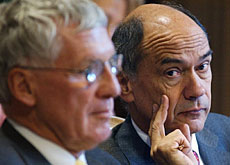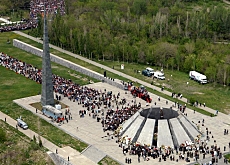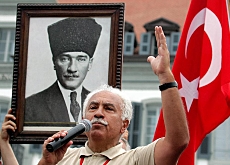Briner sets record straight over Turkey debate

The president of the Senate foreign-affairs committee has denied he ever said that Turkey's massacre of Armenians would not be debated in the chamber.
Peter Briner was reported at the beginning of August as saying that countries had no business pointing the finger at Turkey 90 years after the disputed events.
Briner, a member of the centre-right Radical Party, maintains the Senate’s position is that a committee of historians from the two countries involved should investigate the events of 1915.
The Swiss House of Representatives recognised the death of up to 1.8 million Armenians as genocide in 2003. But unlike many western governments, the Swiss government does not officially speak of “genocide” but of “mass deportation” and “massacre”.
The Turkish government rejects that it was genocide, claiming that the Armenian deaths as a result of mass evacuation and starvation were not a result of a state-sponsored plan of extermination.
swissinfo: You say reports are false which claim you said the Senate will never recognise the Turkish massacre of Armenians 90 years ago as genocide. What is the Senate’s position regarding those events?
Peter Briner: Those reports are based on either a misquote or a misunderstanding – and this is of course most regrettable. What I did say was that when the Swiss House of Representatives had [voted to] recognise the genocide, this was not an issue in the Senate.
The policy of our government – and the Senate foreign-affairs committee – is that the two countries involved, Turkey and Armenia, should investigate the terrible events of 1915 with a committee of historians from both sides.
swissinfo: Two years ago the House of Representatives recognised the massacre as genocide. Why did the debate not pass to the Senate?
P.B.: The House of Representatives vote was only [in response to] a motion and not on the parliament’s agenda. We discussed this and we felt that the policy of our government was the wiser course.
swissinfo: So the Armenian question is still a topic of discussion for the Senate?
P.B.: I can never be sure what will be on the Senate’s agenda, of course, but right now the postponement of Economics Minister Joseph Deiss’ invitation to Turkey will certainly be discussed during our next committee meeting on August 23.
swissinfo: Why won’t the Senate recognise the Armenian deaths as genocide like other western countries?
P.B.: I think that the position of our government is the better one. I don’t feel comfortable being the judge of the whole world and of something that happened a long time ago.
These are evidently terrible events and I think that they should be investigated, but they should be primarily investigated by the parties involved.
swissinfo: How would you describe Swiss-Turkish relations at the moment?
P.B.: They are normally good – we felt this when a delegation of the Senate foreign-affairs committee visited the Turkish parliament last September. Then a Turkish delegation visited us this summer and we talked about these things in a friendly way.
Relations have of course been strained by recent events but I think in the long run good relations will prevail. I think relations between the two countries will remain good and prosper as they have done in the past.
swissinfo-interview: Thomas Stephens
The historical interpretation of the deaths or deportations of between 800,000 and 1.8 million Armenians between 1915 and 1919 has caused tensions between Turkey and many European countries.
The killings have been recognised as genocide by the parliaments of several countries, including France, Russia and Italy.
The European Parliament recognised it in 1987.
The Swiss House of Representatives followed suit in 2003.
The Swiss government does not officially speak of “genocide”, but of “mass deportation” and “massacre”.
Peter Briner, president of the Senate foreign-affairs committee, denies saying Turkey’s massacre of Armenians in the First World War era will never be debated by the Senate.
He says the Senate’s position remains that a joint committee of historians from the two countries involved should investigate the events.

In compliance with the JTI standards
More: SWI swissinfo.ch certified by the Journalism Trust Initiative



You can find an overview of ongoing debates with our journalists here. Please join us!
If you want to start a conversation about a topic raised in this article or want to report factual errors, email us at english@swissinfo.ch.